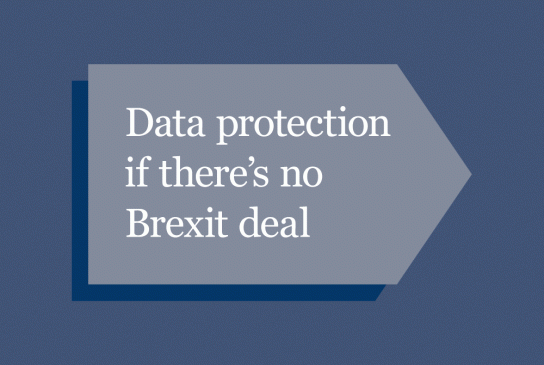The ICO has urged businesses to “prepare for all scenarios” as it publishes dedicated guidance to help small and medium sized organisations prepare for the possibility that the UK leaves the European Union with no deal.
The guidance provides the same advice previously published on how to maintain data flows, but has been produced to be more relevant and accessible to smaller organisations.
The sharing of customers’, citizens’ and employees’ personal data between EU member states and the UK is vital for business supply chains to function and public authorities to deliver effective public services.
At the moment personal data flow is unrestricted because the UK is an EU member state. In the event of ‘no deal’, EU law will require additional measures to be put in place when personal data is transferred from the European Economic Area (EEA) to the UK, in order to make them lawful.
The ICO’s guidance sets out steps to take to keep the information flowing such as using pre-approved contract terms, which are currently used to transfer personal information worldwide.
Information Commissioner Elizabeth Denham said:
“It’s crucial that organisations make sure they properly prepare for all scenarios. If your organisation sends or receives personal information to countries in the EU, this guidance will help you work out whether you need to take steps now, what you need to do to prepare, and then let you get back to running your business.
“Even if you think your organisation doesn’t transfer data internationally, I’d urge you to read what we’ve produced, and assess whether you need to act.”
The ICO website offers a range of advice and guidance to help organisations prepare for the UK leaving the EU, including checklists and interactive tools.
Notes to Editors
- The Information Commissioner’s Office (ICO) is the UK’s independent regulator for data protection and information rights law, upholding information rights in the public interest, promoting openness by public bodies and data privacy for individuals.
- The ICO has specific responsibilities set out in the Data Protection Act 2018 (DPA2018), the General Data Protection Regulation (GDPR), the Freedom of Information Act 2000 (FOIA), Environmental Information Regulations 2004 (EIR) and Privacy and Electronic Communications Regulations 2003 (PECR).
- The General Data Protection Regulation (GDPR) has provisions included in the Data Protection Act 2018. The Act also includes measures related to wider data protection reforms in areas not covered by the GDPR, such as law enforcement and security.
- The data protection principles in the GDPR evolved from the original DPA, and set out the main responsibilities for organisations. Article 5 of the GDPR requires that personal data shall be:
- Processed lawfully, fairly and in a transparent manner in relation to individuals;
- Collected for specified, explicit and legitimate purposes and not further processed in a manner that is incompatible with those purposes;
- Adequate, relevant and limited to what is necessary in relation to the purposes for which they are processed;
- Accurate and, where necessary, kept up to date
- Kept in a form which permits identification of data subjects for no longer than is necessary; and
- Processed using appropriate technical or organisational measures in a manner that ensures appropriate security of the personal data.”
- Article 5(2) requires that “the controller shall be responsible for, and be able to demonstrate, compliance with the principles.”
- To report a concern to the ICO go to ico.org.uk/concerns.




